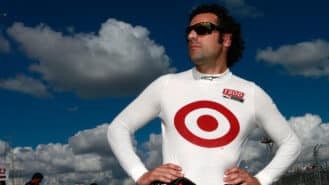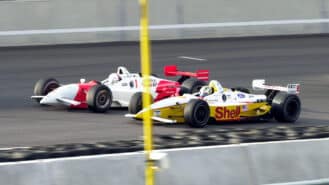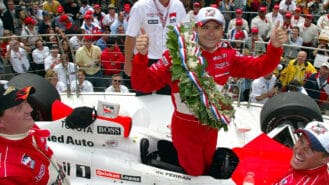
Rick Mears stands with A.J. Foyt and Al Unser as one of only three men to win the Indy 500 four times, taking victory in 1979, ’84, ’88 and ’91, and qualified on pole at Indy a record six times. Mears also won three CART championships and scored 29 individual race wins. He’s ranked eighth on the all-time IndyCar winners list and was the most successful Indy car driver of his era, and was considered the king of the speedways. For him, the faster the track, the better.
There’s no question in his mind that his fourth win at Indianapolis in 1991 was his most rewarding – bouncing back from a big accident during practice to out-duel Michael Andretti in the closing laps.

“That was definitely the most special of my four wins at Indy,” Rick reflects. “After hitting the fence for the first time at Indy and fracturing a bone in my foot and having to drive three-quarters of the race with my left foot on top of my right foot for the throttle, and then for it to come down to the end and playing your cards right, all these things made it a very satisfying win.
“I wanted to do it by winning the race at the end against the fastest car all day. He didn’t fall out. We did battle with him and beat him. That’s the way it’s supposed to be.”

A year and a half later, at the end of 1992, just after his 41st birthday, Rick announced his retirement from racing. He was still at the height of his powers and chose exactly the right moment to retire, a rare thing in most sports, motor racing in particular.
“The remarkable Mr Mears” by David Tremayne (February 1993)
“Rick was an incredible talent,” Mario Andretti comments. “He was always given so much credit for being such an ace on ovals. I think that disturbed him to some degree because he was able to rise to the occasion on the road courses as well. He was a force to be reckoned with wherever he went. I think he was probably the most misread individual because he was always very kind, very laid-back. But I don’t think anybody’s fire burned any brighter or any stronger in his belly when he was in a race car.”
Simon Taylor has “Lunch with… Rick Mears” (January 2013)
Mears is also recognised as one of the fairest, most ethical drivers in the history of the sport. His behaviour on the track was impeccable, the standard by which all others were judged. “He was very polished,” Andretti adds. “He was probably one of the most correct drivers out there to race against. I always had the greatest respect for Rick.”

Mears is pleased to enjoy a legacy for being brilliantly fast but eminently fair. “That means a lot to me,” he reflects. “I never really thought about it, except when somebody brings it up. But it means a lot to me; because then I feel whatever we’ve earned was earned in the right way. It’s not like cutting corners. I feel like we’ve earned it fair and square. I’ve always felt like that’s the way it should be done. I guess it’s the way we were brought up.
“That’s what racing was all about to us as kids growing up. It was figuring out how to get by the next guy, but doing it the way it ought to be done. We always wanted to shove back a little if anybody shoved at us. But you don’t want to initiate it. If someone does it to you, there’s a payback when the time comes, if it’s necessary. You don’t feel bad about it then, but that’s the only circumstances when you’ll lean on anybody. You never initiate it.”
Thus reads the gospel of one of automobile racings greatest, smoothest, most sportsmanlike drivers. A humble, entirely unpretentious man, Mears was an unadorned genius as a driver with a deft touch at the wheel. Rick’s honesty, openness and remarkable lack of ego made him one of the most perfect teammates and sportsmen motor racing has ever seen.
“The man who said no to Bernie” by Gordon Kirby (June 2008)
You can cast your vote for Rick in the Motor Sport Hall of Fame US Racing category here.








